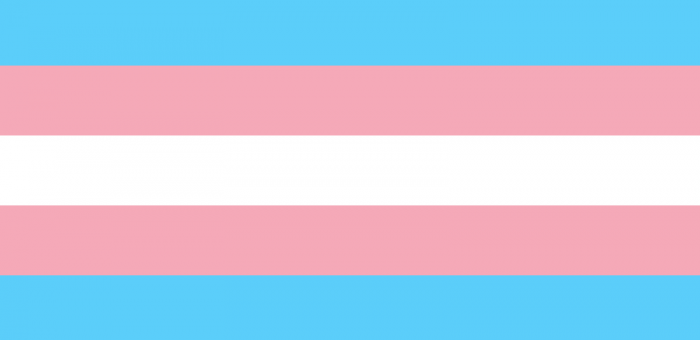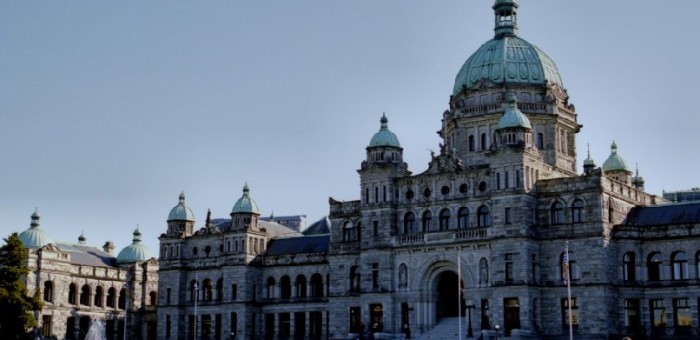Youth
Introducing two bills to protect gender identity and expression privacy rights
Yesterday in the legislature I had the pleasure of introducing five remarkable youth: Megan Walker, Grayson Threlfall, Astrid Nielson-Miller, Alex Bradley and Avery Williams. They, together with 20 other British Columbia youth, are working with Dr. Lindsay Harriet at the University of Victoria on writing a book about what it’s like to grow up as a transgender person in 2018. Their project is called The Transgender Tipping Point.
 But their good work goes far beyond the book that they are writing. A few weeks ago I met with youth working on this project. One of them raised the important notion that two key bills, the Freedom of Information and Protection of Privacy Act and the Personal Information Protection Act did not protect gender identity and expression or contained gendered language that did not instill confidence in the transgender community concerning the interpretation of the act.
But their good work goes far beyond the book that they are writing. A few weeks ago I met with youth working on this project. One of them raised the important notion that two key bills, the Freedom of Information and Protection of Privacy Act and the Personal Information Protection Act did not protect gender identity and expression or contained gendered language that did not instill confidence in the transgender community concerning the interpretation of the act.
I agreed and so worked with them, together with a legislative intern Kayla Phillips, to draft amendments to these bills. Today I introduced both the Freedom of Information and Protection of Privacy Amendment Act, 2018 and the Personal Information Protection Amendment Act, 2018.
Below I reproduce the video and text of the introductions as well as our accompanying press release. I look forward to work with my colleague Spencer Chandra Hebert in the BC NDP to see if we cant get these bills passed in a timely fashion.
Video of Bill Introductions
Text of Bill Introductions
BILL M208 — FREEDOM OF INFORMATION AND PROTECTION OF PRIVACY AMENDMENT ACT, 2018
A. Weaver: I move that a bill intituled the Freedom of Information and Protection of Privacy Amendment Act, 2018, of which notice has been given in my name on the order paper, be introduced and read a first time now.
The right to privacy is well established in British Columbia, as is the right to be free from discrimination because of gender identity and expression. Under the Freedom of Information and Protection of Privacy Act, however, gender identity and expression is not recognized as a category of personal information that must be protected when its disclosure may harm a third party.
In addition to proposed changes to ensure the protection of gender identity and expression in freedom-of-information releases, the bill also proposes a move to gender-inclusive language. This would demonstrate a commitment to protect the personal information of gender identity and expression in the legislation to an even larger extent and provide the act with an update making it more representative of the people it is meant to protect.
I wish to recognize the young members in the gallery today, who have been quite instrumental in bringing this to my attention, as well as the good work done by the member for Vancouver–West End, whose championing of this in the Legislature over many years has also informed me and others as to the importance of acts like these.
Mr. Speaker: The question is first reading of the bill.
Motion approved.
A. Weaver: I move that the bill be placed on the orders of the day for second reading at the next sitting of the House after today.
Bill M208, Freedom of Information and Protection of Privacy Amendment Act, 2018, introduced, read a first time and ordered to be placed on orders of the day for second reading at the next sitting of the House after today.
BILL M209 — PERSONAL INFORMATION PROTECTION AMENDMENT ACT, 2018
A. Weaver: I move that a bill intituled the Personal Information Protection Amendment Act, 2018, of which notice has been given in my name on the order paper, be introduced and read a first time now.
The protection of people’s private and personal information is essential, especially when the information could have negative impacts or when its release was not consented to. Too often, personal information regarding gender identity or expression is revealed.
This amendment would replace 16 instances of gendered language throughout the act with gender-neutral language. By explicitly making a point of doing this, it reinforces to those who may rely on the act that gender identity and expression is important personal information that should not be revealed without that party’s consent. This bill will build trust between those who wish to keep their gender identity and expression private and those they seek guidance from concerning personal and confidential issues.
I would like to thank for this, as well, the youth in the gallery above, for bringing this to my attention, and once more to the member for Vancouver–West End, who was an advocate for language and issues like this over the years and has also made this an important topic of discussion in the Legislature.
Mr. Speaker: The question is first reading of the bill.
Motion approved.
A. Weaver: I move that the bill be placed on the orders of the day for second reading at the next sitting of the House after today.
Bill M209, Personal Information Protection Amendment Act, 2018, introduced, read a first time and ordered to be placed on orders of the day for second reading at the next sitting of the House after today.
Media Release
March 15, 2018
Weaver introduced private members bills to protect and acknowledge diverse gender identities
For immediate release
VICTORIA, B.C. – Andrew Weaver, leader of the B.C. Green Party, introduced two private members bills to that would further the rights of British Columbians with diverse gender identity and expression. The bills are amendments to the Freedom of Information and Protection of Privacy Amendment Act (FIPPA) and the Personal Information Protection Amendment Act (PIPA).
“Personal information such as sexual orientation, race, ethnicity and religious affiliation is already protected under FIPPA, in 2018 we should absolutely include gender identity and expression,” said Weaver.
“People with diverse gender identity and expression still face discrimination and far too often violence. It is essential that this information be protected to ensure it is not be released without their consent.”
Weaver was made aware of the need for these changes after meeting with local trans youth from The Trans Tipping Point Project, a UVic initiative organized by Dr. Lindsay Herriot and Kate Fry, with young trans people from across Canada.
“It was an amazing feeling to speak truth to power, and to be heard and listened to, and then have something done about it. I am incredibly thankful for the opportunity, and to everyone who supported us in making this happen,” said Avery Williams, one of the Trans Tipping Point Project youth.
The amendment to FIPPA would ensure that information regarding an individual’s gender identity and expression cannot be revealed by the head of a public body, and that it must be redacted in Freedom of Information Requests. The amendment to PIPA would replace instances of gendered language (he and she) with gender neutral language, reinforcing the principle that gender identity is important and is personal information that should not be revealed without consent.
-30-
Media contact
Jillian Oliver, Press Secretary
+1 778-650-0597 | jillian.oliver@leg.bc.ca
Reintroducing a bill to lower the voter age in British Columbia to 16
Today in the BC Legislature I reintroduced a bill that would lower the voter age in British Columbia to 16. This is the third time I’ve introduced this bill. I’ve provided a detailed rationale for it here, here and here, and expanded upon it further in a Vancouver Sun article that was published today.
Below I reproduce the video and text of my introduction of the bill, as well as the media statement that we released.
Video of Introduction
Text of Introduction
A. Weaver: It gives me great pleasure to introduce a bill that, if enacted, would lower the voting age to 16 in British Columbia.
The voting age in British Columbia was not always 18. Federally, it wasn’t until 1970 that the Canada Elections Act was amended to drop the voting age from 21 to 18. In British Columbia we made the jump in two steps. First, in 1952 we dropped the voting age from 21 to 19, but it wasn’t until 1992 that we made the subsequent change to lower the age to 18.
Around the world, more and more jurisdictions are openly discussing the notion of dropping the voting age to 16, and, in fact, a growing number have actually done so. Austria, Argentina, Brazil, Germany and Scotland are but a few of the jurisdictions that have extended voting rights to 16-year-olds.
There’s ample evidence to suggest that the earlier in life a voter casts their first ballot, the more likely they are to develop voting as a habit throughout their lifetime.
Sadly, in the 2017 election, only 56 percent of youth aged 18-24 and only 46 percent of young adults aged 25-34 voted here in British Columbia. Compare that to the provincial average of 61 percent and to the 75 percent of seniors aged 65-74 who voted.
It’s also a common misconception that 16-years-old are not as informed and engaged in political issues as older voters. The research, however, says otherwise.
Sixteen- and 17-year-olds are old enough to drive, pay taxes, get married and sign up for the military. They should have a say in the direction our province is heading as they ultimately inherit what we leave behind.
Mr. Speaker: The question is first reading of the bill.
Motion approved.
A. Weaver: I move that the bill be placed on the orders of the day for second reading at the next sitting of the House after today.
Bill M205, Election Amendment Act, 2018, introduced, read a first time and ordered to be placed on orders of the day for second reading at the next sitting of the House after today.
Media Release
Weaver re-introduces bill to extend voting rights to 16 and 17-year olds
For immediate release
March 13, 2018
VICTORIA, B.C. – Andrew Weaver, leader of the B.C. Green Party, introduced a Private Member’s bill to lower the voting age to 16 in B.C. This is the third time Weaver has introduced the bill.
“Young British Columbians have the greatest stake in the future of our province; they should have a say in the decisions our politicians make,” said Weaver.
“Yesterday, Elections B.C. announced that only 56.24% of 18-24 year olds and 46.35% of 25-35 year olds voted in our last provincial election. Voting rights have been extended to 16 year-olds in Scotland, Argentina, Austria and Brazil. Evidence from those jurisdictions shows that enfranchising these young voters has led to substantially higher levels of political participation.
“Moreover, research shows that the cognitive skills required to make calm, logically informed decisions are firmly in place by age 16. Young citizens of British Columbia are old enough to drive, pay taxes and sign up for the military. They are also the leaders of tomorrow. They should have a say in the direction we are heading, as they will inherit what we leave behind. B.C. should take this chance to strengthen our democracy and lower the voting age to 16.”
-30-
Media contact
Jillian Oliver, Press Secretary
+1 778-650-0597 | jillian.oliver@leg.bc.ca
Apply for 2017 BC Youth Parliament
The 89th British Columbia Youth Parliament will hold its parliamentary session in Victoria at the Provincial Legislative Chambers from December 27 to 31, 2017. The Youth Parliament is a province-wide non-partisan organization for young people ages 16 to 21. It teaches citizenship skills through participation in the December parliamentary session and in community service activities throughout the year. Youth Parliament is a one year commitment.
The BC Youth Parliament is non-partisan and applicants need only be interested in learning more about the parliamentary process and in serving their community.
The application is available here, along with an informational brochure and poster.
All applications must be received by October 24, 2017. Selected applicants will be notified in early November.
Comments on Vancouver School Board Firing
For immediate release
Oct. 17, 2016
Weaver Comments on Vancouver School Board Firing
Victoria, B.C. – “For public education to thrive in British Columbia, the provincial government must work effectively and in partnership with Boards of Education to put students first,” said Andrew Weaver, leader of the B.C. Green Party and MLA for Oak Bay-Gordon Head. “Minister Bernier’s announcement today is yet another example of how the dysfunctional relationship between the B.C. Liberals and Boards of Education results in the spending of more time and money on opposing each other than on finding solutions that will benefit students and teachers in the classroom.”
“We need to build relationships that establish trust. Education in B.C. needs a fresh start. The B.C. Greens are committed to working collectively with all stakeholders to make public education a priority and put the interests of BC students first.”
“With the cancelling of the fall Legislative session, this major decision was made without parliamentary oversight, allowing the B.C. Liberals to avoid being held accountable for their continued mismanagement of our public education system.”
– 30 –
Media contact
Mat Wright
Press Secretary
Office of Andrew Weaver, MLA
+1 250-216-3382
Introducing Bill M236 — Environmental Bill of Rights Act, 2016
Today in the Legislature I introduced a bill intituled Environmental Bill of Rights Act, 2016.
This Bill specifically states that British Columbians have a right to a healthy environment and that it is the government’s responsibility to protect it for this generation as well as those to come. There are five key components to this Bill. The Bill:
- outlines the Rights and Responsibilities of the BC Government and its residents when it comes to environmental decision making;
- creates a publicly accessible one-stop-shop for environmental information;
- ensures that all ministries consider the environmental impacts their operations may be responsible for;
- creates an environmental commissioner responsible for investigating violations, providing the public an opportunity to participate in and access the decision making process, and providing regular reports about the state of the B.C. environment.
- protects whistle blowers who act to prevent or mitigate environmental damage.
I am no longer confident that the next generation of British Columbians will enjoy the same opportunities that we have today. The problem is that governments are frequently pitting the environment against industry and it doesn’t have to be that way.
The rhetoric that we hear in this province — the forces of no,’ ‘get to yes’ no matter what the question is — is not helpful to anybody, despite the fact that it’s a great sound bite. The intention of my bill is to create the rules in which industry can operate. Industry has crying out for this; the last thing industry wants is uncertainty. They want to know what the rules are. They want to know what the penalties are. They want to know how they can do business in British Columbia.
Municipalities in BC have recently expressed significant support for an Environment Bill of Rights Act, including 47 who have made a declaration affirming British Columbians rights to a healthy environment (in response to the Blue Dot Tour), as well as passing an endorsement at the 2015 UBCM Convention for a provincial bill outlining the same.
It’s time that we moved on from the outdated thinking that every environmental law brought forward is somehow an attack on industry. I have visited projects across British Columbia and the most successful businesses, which also create the greatest benefits for their local economy, are those that account for their impacts on the environment. This should become the norm for anyone who wants to do business in B.C.
Below I reproduce the video and text of the introduction of my bill. I also reproduce the accompanying media statement.
Video of my Introduction
Text of my Introduction
A. Weaver: I move that a bill intituled Environmental Bill of Rights Act, 2016, of which notice has been given in my name, be introduced and read a first time now.
Motion approved.
A. Weaver: Over the past decade, British Columbia has seen steadied erosion of the environmental laws in our province. The lack of any significant climate action from this province is a clear example. By outlining the rights and responsibilities of the B.C. government and the citizens of British Columbia, this bill is designed to complement and expand upon the existing legislation used when decisions impact the environment.
This bill reinforces British Columbians’ right to a healthy environment and the government’s responsibility to protect it for this generation and those to come. A version of this legislation has already been passed in five legislatures across Canada: Ontario, Quebec, Yukon, Nunavut and Northwest Territories.
Furthermore, 47 municipalities in British Columbia have already made declarations concerning their citizens’ rights to a healthy environment. This was reaffirmed at the UBCM convention last fall when a motion was endorsed to call for legislation that grounded this right in environmental law.
I visited resource development projects across British Columbia. The most successful of these, which also create the greatest benefits for their local economy, are those that account for their impacts on the environment. This should become the norm for anyone who wants to do business in B.C.
The Environmental Bill of Rights Act introduces a number of new policy measures that will assure increased transparency and access to environmental decision-making and create a stronger framework for British Columbians to be included in environmental decisions made in this province.
I move that the bill be placed on the orders of the day for second reading at the next sitting of this House after today.
Bill M236, Environmental Bill of Rights Act, 2016, introduced, read a first time and ordered to be placed on orders of the day for second reading at the next sitting of the House after today.
Media Statement
Media Statement: May 16, 2016
Environmental Bill of Rights Act introduced by Andrew Weaver
For Immediate Release
Victoria B.C. – To safeguard the right of current and future generations to a healthy environment, British Columbians must be able to effectively engage with the provincial government’s duty to protect the environment under its jurisdiction – and to hold the government accountable when they fail to do so, says Andrew Weaver, MLA for Oak Bay – Gordon Head and Leader of the BC Green Party.
In order to accomplish this, today in the legislature Dr. Weaver introduced the Environmental Bill of Rights Act. By outlining the rights and responsibilities of the BC Government and the citizens of British Columbia this bill is designed to complement and expand on the existing legislation used when decisions impact the environment. The bill reinforces British Columbians’ right to a healthy environment and the Government’s responsibility to protect it for this generation and those to come.
“It’s time that we moved on from the outdated thinking that every environmental law brought forward is somehow an attack on industry,” said Weaver. “I have visited projects across British Columbia and the most successful businesses, which also create the greatest benefits for their local economy, are those that account for their impacts on the environment. This should become the norm for anyone who wants to do business in B.C.”
A number of Canadian jurisdictions have enacted similar legislation including Ontario, Quebec, Yukon, Nunavut and the Northwest Territories. In addition, 47 municipalities across British Columbia have passed municipal declarations supporting the right to a healthy environment. A similar declaration was endorsed at the UBCM Conference last fall, which called on the provincial government to enact a provincial environmental bill of rights.
“While we talk a big game in this province about our environmental protections, the fact is that our environmental laws have eroded over time,” said Weaver. “I am no longer confident that the next generation of British Columbians will enjoy the same opportunities that we have today, and I am concerned with the burden we place on them when rushed processes and projects cause unnecessary environmental damage.”
The Environmental Bill of Rights Act introduces a number of new policy tools which will ensure increased transparency and access to environmental decision-making and create a stronger framework for British Columbians to be included in environmental decisions made in this province.
Any decisions involving environmental matters would be documented in a new, publicly accessible, online registry. Currently only certain types of information are available in a generally piecemeal format.
The Bill also creates a new independent Commissioner of the Environment, who is responsible for investigating violations, providing the public an opportunity to participate in and access the process, and providing regular reports about the state of the B.C. environment.
“Frankly, I think it’s time that British Columbians were given more tools to ensure that their province doesn’t just talk a good game about protecting the environment – but is actually doing the job they are elected to do,” said Weaver.
-30-
Media Contact
Mat Wright – Press Secretary Andrew Weaver MLA
1 250 216 3382
mat.wright@leg.bc.ca








